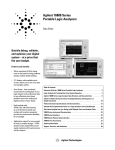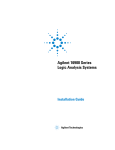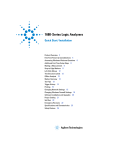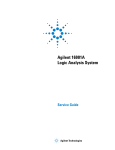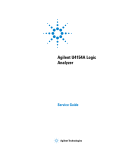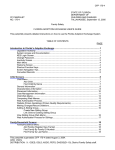Download Agilent Technologies 16800 Series Technical data
Transcript
Agilent 16800 Series Portable Logic Analyzers Installation/Quick Start Guide REPRODUCTION AND DISTRIBUTION OF THIS TECHNICAL MANUAL IS AUTHORIZED FOR GOVERNMENT PURPOSES. Agilent Technologies Notices © Agilent Technologies, Inc. 2006-2011 Warranty No part of this manual may be reproduced in any form or by any means (including electronic storage and retrieval or translation into a foreign language) without prior agreement and written consent from Agilent Technologies, Inc. as governed by United States and international copyright laws. The material contained in this document is provided “as is,” and is subject to being changed, without notice, in future editions. Further, to the maximum extent permitted by applicable law, Agilent disclaims all warranties, either express or implied, with regard to this manual and any information contained herein, including but not limited to the implied warranties of merchantability and fitness for a particular purpose. Agilent shall not be liable for errors or for incidental or consequential damages in connection with the furnishing, use, or performance of this document or of any information contained herein. Should Agilent and the user have a separate written agreement with warranty terms covering the material in this document that conflict with these terms, the warranty terms in the separate agreement shall control. Manual Part Number 16800-97013 Edition Third Edition, October 2011 Printed in Malaysia Agilent Technologies, Inc. 1900 Garden of the Gods Road Colorado Springs, CO 80907 USA Microsoft ® is a U.S. registered trademark of Microsoft Corporation. Technology Licenses The hardware and/or software described in this document are furnished under a license and may be used or copied only in accordance with the terms of such license. Restricted Rights Legend U.S. Government Restricted Rights. Software and technical data rights granted to the federal government include only those rights customarily provided to end user customers. Agilent provides this customary commercial license in Software and technical data pursuant to FAR 12.211 (Technical Data) and 12.212 (Computer Software) and, for the Department of Defense, DFARS 252.227-7015 (Technical Data - Commercial Items) and DFARS 227.7202-3 (Rights in Commercial Computer Software or Computer Software Documentation). 2 Safety Notices CAUTION A CAUTION notice denotes a hazard. It calls attention to an operating procedure, practice, or the like that, if not correctly performed or adhered to, could result in damage to the product or loss of important data. Do not proceed beyond a CAUTION notice until the indicated conditions are fully understood and met. WA R N I N G A WARNING notice denotes a hazard. It calls attention to an operating procedure, practice, or the like that, if not correctly performed or adhered to, could result in personal injury or death. Do not proceed beyond a WARNING notice until the indicated conditions are fully understood and met. 16800 Series Portable Logic Analyzers Installation/Quick Start Guide 16800 Series Logic Analyzers—At a Glance The Agilent Technologies 16800 Series logic analyzers are portable logic analyzers that range from 34 to 204 logic acquisition channels and 48 pattern generator channels, depending on the model. Accessories Pouch (top flap) Tie-down Straps Scroll Knob Pod Cables Run/Stop Keys USB 2.0 Ports (2) Table 1 Model comparisons Agilent model number 16801A 16802A 16803A 16804A 16806A 16821A 16822A 16823A Logic acquisition channels 34 68 102 136 204 34 68 102 Pattern generator channels 0 0 0 0 0 48 48 48 16800 Series Portable Logic Analyzers Installation/Quick Start Guide 3 Features, Logic Acquisition • 1 M to 32 M memory depth per channel (depending on memory option), software upgradeable. • 250 MHz or 500 Mb/s maximum state data rate (depending on state speed option), software upgradeable. The 500 Mb/s maximum state data rate option is available on the 68- channel and above logic analyzer models. • 1 GHz, 64 M deep timing analysis on half channels. • Eye finder (automatic threshold and sample position setup) feature. • 4 GHz timing zoom with 64 K memory depth. Features, Mainframe • Built- in 15 inch TFT color LCD display, 1,024 x 768 (XGA) resolution. Touch screen with 16800A Option 103. • 80 GB hard disk drive (or external hard drive 16800A Option 109). • 10/100 Base- T LAN port. • USB 2.0 ports (six total, two on front, four on back). • One PCI expansion slot. • One PCI Express x1 expansion slot. • The legacy 16800 series Logic Analyzers have the Windows XP installation. The 16800 Logic Analyzers with the serial number of MY51420101 or higher have Windows 7 installation. • Agilent Logic Analyzer application which takes the complexity out of making logic analyzer measurements. You can perform all operations directly from one window. Features, Pattern Generator • 24 channels at 300 MHz clock; 48 channels at 180 MHz clock. • Memory Depth: 16,777,216 vectors in half- channel mode. 4 16800 Series Portable Logic Analyzers Installation/Quick Start Guide • Logic Level (data pods): 5 V TTL, 3- state TTL, 3- state TTL/CMOS, 3- state 1.8 V, 3- state 2.5 V, 3- state 3.3 V, ECL, 5 V PECL, 3.3 V LVPECL, and LVDS. • Data Inputs: 3- bit pattern level sensing (clock pod). • Clock Output: Synchronized to output data, delay of 7 ns in 14 steps (clock pod). • Clock Input: DC to 300 MHz (clock pod). • Internal Clock Period: Programmable from 1 MHz to 300 MHz in 1 MHz steps. • External Clock Period: DC to 300 MHz. • External Clock Duty Cycle: 1.3 ns minimum high time. Supplied Accessories • PS2 mouse. • PS2 keyboard. • Accessory pouch and power cord. Snap the accessories pouch to the top of the 16800 Series logic analyzer. Use it to store probe leads, accessories, or manuals. Use the tie- down straps under the flap to conveniently hold pod cables not in use or during transport. Optional Accessories • Probes. Front Panel Refer to the online help in the logic analyzer for information on using the analyzer. Rear Panel Before you turn on the system, connect your mouse and keyboard to the 16800 Series logic analyzer rear panel. If a touch screen (Option 103) is not included, a connected mouse and keyboard are required for normal system use. 16800 Series Portable Logic Analyzers Installation/Quick Start Guide 5 In This Guide… This guide describes how to set up, use, and update your 16800 Series logic analyzer. It also contains information on solving problems and additional safety information. 1 First-Time Set Up This chapter describes the steps in setting up the logic analyzer for the first time. 2 Getting Started with the Logic Analyzer This chapter describes some basic features of the logic analyzer and tells you where to find more information on using the logic analyzer. 3 Updating the Logic Analyzer This chapter describes how to change your logic analyzer’s network and Windows Firewall settings. It also describes how to get and install software updates. 4 Solving Problems This chapter describes the logic analyzer’s built- in self tests and recovering system software. 5 Safety Notices This chapter contains additional safety information. 6 16800 Series Portable Logic Analyzers Installation/Quick Start Guide Contents 1 First-Time Set Up Proper Cooling 11 12 First-Time Set Up Considerations 13 Determine Whether the Instrument will be Connected to the Network Get Network Setup Information 13 13 First-Time Set Up On Legacy 16800 Series Logic Analyzers With Windows XP Installation 15 Answering Windows Welcome Questions 15 If expected Windows Welcome questions do not appear 16 First-Time Set Up On 16800 Series Logic Analyzers with Windows 7 Installation 18 Additional First-Time Setup Steps 20 Establishing an Administrator Account (recommended for standalone and networked instruments) 20 Protecting the Instrument’s Operating System 20 2 Getting Started with the Logic Analyzer Probing 21 22 Making a Measurement Snap to Edge Markers Left-Click Menus 23 25 26 Tree Structure Bus/Signal Names Offline Analysis Marker Overview 26 27 27 16800 Series Portable Logic Analyzers Installation/Quick Start Guide 7 Contents Tool Tips 28 Trigger History 29 To power off the system 30 Using the Windows Shutdown 30 Using a Short Press of the Power Button 30 Using a Long Press of the Power Button 31 Unplugging the Power Cord or Power Loss 31 Specifications and Characteristics 3 Updating the Logic Analyzer Changing Network Settings On Windows XP 36 On Windows 7 36 32 35 36 Changing Windows Firewall Settings 37 To give other applications/ports access through the firewall To restore the logic analyzer firewall defaults 41 Software Installation and Upgrades Agilent Logic Analyzer Software Optional Products 45 4 Solving Problems 47 Running Self-Tests 48 44 44 If the logic analyzer powers itself down If the Power LEDs do not come on 49 49 If you get a registry error and the system won’t boot If there are network connection problems If there are touch screen problems 37 49 50 51 Using the System Recovery Software 54 On a Legacy 16800 Series Logic Analyzer with Windows XP Installation 8 54 16800 Series Portable Logic Analyzers Installation/Quick Start Guide Contents On a 16800 Series Logic Analyzer with Windows 7 Installation Contacting Agilent Service/Support 5 Safety Notices Warnings 59 61 62 To clean the instrument Safety Symbols Index 54 64 65 67 16800 Series Portable Logic Analyzers Installation/Quick Start Guide 9 Contents 10 16800 Series Portable Logic Analyzers Installation/Quick Start Guide Agilent 16800 Series Portable Logic Analyzers Installation/Quick Start Guide 1 First-Time Set Up Proper Cooling 12 First-Time Set Up Considerations 13 First-Time Set Up On Legacy 16800 Series Logic Analyzers With Windows XP Installation 15 First-Time Set Up On 16800 Series Logic Analyzers with Windows 7 Installation 18 Additional First-Time Setup Steps 20 Agilent Technologies 11 1 First-Time Set Up Proper Cooling Allow at least 5 cm (2 inches) of space between instruments for proper cooling. 5 cm (2 inches) 12 5 cm (2 inches) 16800 Series Portable Logic Analyzers Installation/Quick Start Guide First-Time Set Up 1 First-Time Set Up Considerations Determine Whether the Instrument will be Connected to the Network NOTE If you plan to use COM automation to programmatically control a logic analyzer from a remote computer, be aware that the remote computer and the logic analyzer must both have the same kind of network membership; that is, they must both be members of a "Workgroup", or they must both be members of a "Domain". This is due to the security requirements of Distributed COM. Standalone You are going to use the logic analyzer as a standalone instrument (no LAN connection). Printing requires a printer attached to the logic analyzer, sharing files is done via USB flash drive or floppy disk. Connected to a Network If you require the ability to print, share files, remotely control the logic analyzer, etc. over the network, you need to either join a workgroup or domain. Get Network Setup Information For networking, find out whether the network that your instrument will be connected to uses the Microsoft Workgroup model or Microsoft Domain model. In order for your instrument to perform tasks over the network (print, transfer files, etc.) your instrument must be configured appropriately for the networking model in use at your site. Information you may require to complete your network configuration may include, but is not limited to: • The Workgroup or Domain name. 16800 Series Portable Logic Analyzers Installation/Quick Start Guide 13 1 First-Time Set Up • Methodology for assigning IP addresses at your site (for example, DHCP). • Domain Name Service (DNS). Other network information that may be readily available from your network administrator. 14 16800 Series Portable Logic Analyzers Installation/Quick Start Guide First-Time Set Up 1 First-Time Set Up On Legacy 16800 Series Logic Analyzers With Windows XP Installation The legacy 16800 series logic analyzers are shipped with Windows XP installation. The first time you turn on these logic analyzers, the Windows® Welcome session starts. Your logic analyzer configuration and the answers to the Windows Welcome questions are affected by how you choose to use the logic analyzer. Use the Enter and arrow keys on the attached keyboard. NOTE Answering Windows Welcome Questions Once you have determined how you want to use your logic analyzer and your network configuration, power up your logic analyzer and answer the Windows Welcome questions. Table 2 Answering Windows Welcome Questions Standalone (No LAN) Workgroup Domain Help protect your PC N/A Choose “Help protect my PC by turning on Automatic Updates now”. Choose “Help protect my PC by turning on Automatic Updates now”. What's your computer's name? (After answering, wait several minutes for next question to appear) If your organization has a standard naming scheme, use that scheme. Otherwise, choose a descriptive name that follows the suggestions on the screen (less than 15 characters, etc.) What's your administrator password? Agilent recommends entering an administrator password for administrator accounts. See page 20 for actions that require administrator accounts. Is this computer in a domain? No (Is given WORKGROUP membership) No (Is given WORKGROUP membership) 16800 Series Portable Logic Analyzers Installation/Quick Start Guide Yes Enter the domain name the logic analyzer will log onto. 15 1 First-Time Set Up Table 2 Answering Windows Welcome Questions (continued) Standalone (No LAN) Workgroup Domain Enter your domain settings. N/A N/A Enter the name/password of a user who can add the logic analyzer to the domain. Checking your Internet connectivity Press 'Skip' Wait for this to finish. Wait for this to finish. How will this computer connect to the Internet? N/A N/A Choose the appropriate answer. Setting up a high-speed connection? N/A N/A Enter either the fixed IP/DNS assigned by your network administrator or select "Obtain Automatically". (If LAN connected) Will this computer connect to the Internet directly, or through a network? N/A Choose "Yes, through a network" (Agilent does not support connecting to the internet through a modem directly connected to the logic analyzer.) N/A (If LAN is not connected) Windows unable to determine LAN connectivity. N/A You are told to set up LAN later. N/A Ready to register with Microsoft The legacy 16900 series of Logic Analysis systems have Windows XP already enabled to run. This registration is to allow Microsoft to contact you. Who will use this computer? For All: Entering names here lets multiple users use the logic analyzer with administrator permissions. By default their passwords will be blank. If expected Windows Welcome questions do not appear During first- time power- up, depending on the configuration of your network, some of the Windows Welcome questions that should appear, like “Is this computer in a domain?”, may not appear. 16 16800 Series Portable Logic Analyzers Installation/Quick Start Guide First-Time Set Up 1 If this occurs, you need to change the logic analyzer’s network setup (after the first- time power up) using the normal Windows XP methods (see “Changing Network Settings” on page 36). 16800 Series Portable Logic Analyzers Installation/Quick Start Guide 17 1 First-Time Set Up First-Time Set Up On 16800 Series Logic Analyzers with Windows 7 Installation The first time you turn on a 16800 series logic analyzer that is shipped with Windows 7 installation, you are automatically logged on to the system using the Administrator account and the Windows 7 desktop is displayed. Unlike legacy 16800 series logic analyzers, the Windows Welcome questions are not displayed for setting logic analyzer configurations on these new 16800 logic analyzers the first time you turn these on. However, once you are logged on to the system, you must set the following logic analyzer configurations based on how you want to use your logic analyzer. You use the standard Windows 7 procedures to set these configurations. Table 3 Logic Analyzer Configurations on a 16800 Series Logic Analyzer with Windows 7 Installation Configuration Task Logic Analyzer Usage Standalone (No LAN) Workgroup Protect your instrument’s PC N/A Specify computer name If your organization has a standard naming scheme, use that scheme. Otherwise, choose a descriptive name (less than 15 characters) Specify the administrator password Agilent recommends entering an administrator password for administrator accounts. See page 20 for actions that require administrator accounts. Specify the domain name (if applicable) No (Is given WORKGROUP membership) No (Is given WORKGROUP membership) Yes Enter the domain name the logic analyzer will log onto. Enter your domain settings. N/A N/A Enter the name/password of the user who can add the logic analyzer to the domain. Configure connectivity to the Internet N/A N/A Choose the appropriate Internet connectivity. 18 Turn on Automatic Updates Domain Turn on Automatic Updates 16800 Series Portable Logic Analyzers Installation/Quick Start Guide First-Time Set Up Configuration Task 1 Logic Analyzer Usage Standalone (No LAN) Workgroup Domain Set up a high-speed connection N/A N/A Enter either the fixed IP/DNS assigned by your network administrator or select "Obtain Automatically". Determine if you want to connect the instrument’s PC to the Internet directly or through a network. N/A Agilent does not support connecting to the Internet through a modem directly connected to the logic analyzer. N/A Register with Microsoft The 16800 series of Logic Analysis systems with serial number of MY51420101 or higher have the Windows 7 operating system already enabled to run. This registration is to allow Microsoft to contact you. Specify users for the instrument’s PC You can add multiple users with administrator permissions to allow these users to use the logic analyzer. 16800 Series Portable Logic Analyzers Installation/Quick Start Guide 19 1 First-Time Set Up Additional First-Time Setup Steps Establishing an Administrator Account (recommended for standalone and networked instruments) Agilent recommends that you set up an Administrator account for your logic analyzer. You have to be logged in to the Administrator account to do the following: • Install most software (applies whether the instrument is networked or standalone). • Change the workgroup. • Perform "Windows Updates". • Change firewall settings. Protecting the Instrument’s Operating System Microsoft recommends the following three steps to ensure the instrument's PC is protected. 1 Use an internet firewall. 2 Get operating system updates. 3 Use up- to- date antivirus software. 20 16800 Series Portable Logic Analyzers Installation/Quick Start Guide Agilent 16800 Series Portable Logic Analyzers Installation/Quick Start Guide 2 Getting Started with the Logic Analyzer Probing 22 Making a Measurement 23 Snap to Edge Markers 25 Left-Click Menus 26 Tree Structure Bus/Signal Names 26 Offline Analysis 27 Marker Overview 27 Tool Tips 28 Trigger History 29 Specifications and Characteristics 32 Agilent Technologies 21 2 Getting Started with the Logic Analyzer Probing Probing is the key to effective and efficient use of logic analyzers. Agilent Technologies offers a wide variety of probing accessories that support general- purpose and application- specific measurement needs. We provide reliable, electrically and mechanically unobtrusive probes that make it easy to connect your Agilent logic analyzer to your system under test. For more information on Agilent probes: • See the quick reference card that came with your logic analyzer for an overview of probing solutions. • Go to www.agilent.com/find/logic_analyzer_probes for the most up- to- date information on probe compatibility with a given logic analyzer and purchasing information. • Go to www.agilent.com and search for Probing Solutions for Logic Analysis Systems (publication 5968- 4632E) for a catalog of detailed probing information. To connect and set up a probe, follow the instructions in the User’s Guide that came with the probe. 22 16800 Series Portable Logic Analyzers Installation/Quick Start Guide Getting Started with the Logic Analyzer 2 Making a Measurement 1 Start up the logic analyzer, connect to your target system, and select Setup>Bus/Signal. 2 Assign buses and signals and click OK. 16800 Series Portable Logic Analyzers Installation/Quick Start Guide 23 2 Getting Started with the Logic Analyzer 3 Enter a trigger value. 4 Acquire and view data. 24 16800 Series Portable Logic Analyzers Installation/Quick Start Guide Getting Started with the Logic Analyzer 2 Snap to Edge Markers You can set the markers to jump to the nearest edge of a waveform. A yellow target will show which edge the marker will jump to. 16800 Series Portable Logic Analyzers Installation/Quick Start Guide 25 2 Getting Started with the Logic Analyzer Left-Click Menus Drag a box around parts of the data. When you release the mouse button, a menu appears. Tree Structure Bus/Signal Names Show individual signals in buses by clicking on the + to expand. 26 16800 Series Portable Logic Analyzers Installation/Quick Start Guide Getting Started with the Logic Analyzer 2 Offline Analysis Install the Agilent Logic Analyzer application on another Windows XP, Windows 7, or Windows 2000 computer and you can analyze data without the 16800 Series logic analyzer. 1 Follow the instructions in “Software Installation and Upgrades” on page 44 to load the 16800 Series logic analyzer software on your PC. 2 Acquire a trace with the logic analyzer. 3 Save a configuration file with data. 4 Copy the file to the PC being used for offline analysis. 5 From the Agilent Logic Analyzer application software on your PC, open the configuration file. Marker Overview The marker overview display shows marker locations within the data and the part of data currently being displayed. 16800 Series Portable Logic Analyzers Installation/Quick Start Guide 27 2 Getting Started with the Logic Analyzer Tool Tips Pause the cursor over a tool Icon and a “Tool Tip Window” will appear. 28 16800 Series Portable Logic Analyzers Installation/Quick Start Guide Getting Started with the Logic Analyzer 2 Trigger History Save and recall trigger settings. 16800 Series Portable Logic Analyzers Installation/Quick Start Guide 29 2 Getting Started with the Logic Analyzer To power off the system You can power off the logic analyzer using Windows Shutdown or a short press of the power button. NOTE When powering off the logic analyzer, wait until the fans stop turning (about 15 seconds) before turning the logic analyzer back on. This ensures that internal circuitry restarts in a known state. Using the Windows Shutdown On the logic analyzer desktop click Start>Shut Down or if you are running remote desktop, click Start>Windows Security>Shut Down. This: • Closes all programs that are running. • Writes all data to the disk. • Turns off the power supply. • If the system is unplugged while it is off and then plugged back in, the system will not power on until the power button is pressed. Using a Short Press of the Power Button Pressing the power button on the logic analyzer for a short time (less than 2 seconds): • Closes all programs that are running. • Writes all data to the disk. • Turns off the power supply. If the power button on the Remote Desktop is depressed for a short time (less than 2 seconds or so), a message on the logic analyzer screen (not on the remote desktop) will pop up asking if you really want to power down. Clicking the 'yes' button results in the above events. Clicking 'no' will prevent the shutdown. Not answering the dialog box (clicking neither "Yes" nor "No") will have no effect. Further short presses on the power button will have no effect. 30 16800 Series Portable Logic Analyzers Installation/Quick Start Guide Getting Started with the Logic Analyzer 2 Using a Long Press of the Power Button CAUTION Only use a long press of the power button when the logic analyzer is unresponsive to Windows Shutdown or a short press of the power button. Pressing the power button for more than 4 seconds will power the system down abruptly: • Programs that are running will not be shut down. Any data that has not been written to the disk will be lost. • Turns off the power supply. • If the system is unplugged while it is off and then plugged back in, the system will not power on until the power button is pressed Unplugging the Power Cord or Power Loss CAUTION Only unplug the power cord when the logic analyzer is unresponsive to all other methods for powering off the system. Unplugging power or a power loss is similar to the long press of the power button with one exception: • When the system is plugged back in, it will power up and boot into Windows. 16800 Series Portable Logic Analyzers Installation/Quick Start Guide 31 2 Getting Started with the Logic Analyzer Specifications and Characteristics The following electrical and operating characteristics are not specifications, but are typical operating characteristics for the Agilent 16800 Series logic analyzers. Electrical Characteristics Power Requirements 16801A, 16802A, and 16803A: 115/230 Vac +/- 20%, 48-66Hz, 615W Max. 16804A, 16806A, 16821A, 16822A, and 16823A: 115/230 Vac +/- 20%, 48-66Hz, 775W Max. CAT II (Line voltage in appliance and to wall outlet). Pollution degree 2. Environmental Characteristics (Operating) 32 Temperature Instrument: 0° to + 50° C (+32° to +122° F). Probes/cables: 0° to + 65° C (+32° to +149° F). Altitude 3,000 m (10,000 ft). Humidity Relative humidity 8 to 80% at 40° C (104° F). Avoid sudden, extreme temperature changes which could cause condensation on the circuit board. For indoor use only. 16800 Series Portable Logic Analyzers Installation/Quick Start Guide Getting Started with the Logic Analyzer 2 More specifications and characteristics for your instrument and measurement modules are in the on- line help. To find them go to: 1 Click Help>Help Topics. 2 Click Reference; then, click Specifications and Characteristics. 16800 Series Portable Logic Analyzers Installation/Quick Start Guide 33 2 34 Getting Started with the Logic Analyzer 16800 Series Portable Logic Analyzers Installation/Quick Start Guide Agilent 16800 Series Portable Logic Analyzers Installation/Quick Start Guide 3 Updating the Logic Analyzer Changing Network Settings 36 Changing Windows Firewall Settings 37 Software Installation and Upgrades 44 Agilent Technologies 35 3 Updating the Logic Analyzer Changing Network Settings To make network changes after the first- time power up: On Windows XP The following steps are applicable for a logic analysis system with Windows XP operating system: • To change from a workgroup to a domain or vice versa, click Start then right- click on My Computer and select Properties. Select the Computer Name tab and click Change. • To change network connection properties, click Start>Control Panel>Network Connections. Select the connection you want to change and click Change settings of this connection. For more information on changing network settings, refer to the Windows XP online help. On Windows 7 The following steps are applicable for a logic analysis system with Windows 7 operating system: • To change from a workgroup to a domain or vice versa, click Computer and select Properties. Click the Change Settings link in the Computer name, domain and workgroup settings section. Then select the Computer Name tab and click Change. • To change network connection properties, click Start>Control Panel>Network and Sharing Center. Select the connection you want to change and then set the properties of this connection. For more information on changing network settings, refer to the Windows 7 online help. 36 16800 Series Portable Logic Analyzers Installation/Quick Start Guide Updating the Logic Analyzer 3 Changing Windows Firewall Settings When 16800 Series logic analyzers are shipped from the factory, the Windows Firewall is enabled and set up with the exceptions required by the logic analyzer. To give other applications/ports access through the firewall For example, you may need to change firewall settings in order to: • Use NetOp to remotely control the logic analyzer. • Use RealVNC to remotely control the logic analyzer. On Windows XP To change firewall settings to give other applications/ports access: 1 From the Windows Start menu, choose Start>Control Panel. 2 In the Control Panel window, open Windows Firewall. 16800 Series Portable Logic Analyzers Installation/Quick Start Guide 37 3 38 Updating the Logic Analyzer 16800 Series Portable Logic Analyzers Installation/Quick Start Guide Updating the Logic Analyzer 3 3 In the Windows Firewall dialog, click the Exceptions tab. 4 In the Exceptions tab, if the required program or service is listed, check its box to enable it; otherwise, click Add Program... to give unlisted applications permission to penetrate the firewall, or click Add Port... to give unlisted ports access through the firewall. Refer to the application’s documentation for information on port numbers or other firewall setup information. On Windows 7 To change firewall settings on Windows 7 to give other applications/ports access: 1 From the Windows Start menu, choose Start>Control Panel. 2 In the Control Panel window, click Windows Firewall. 3 Click the Allow a program or a feature through Windows firewall link. 16800 Series Portable Logic Analyzers Installation/Quick Start Guide 39 3 Updating the Logic Analyzer 4 The list of allowed programs and features is displayed. If the required program or service is listed, check its box to enable it; otherwise, click Allow another program... to give unlisted programs permission to penetrate the firewall. Refer to the application’s documentation for more information on port numbers or other firewall setup information. NOTE 40 Note that there are separate Windows Firewall profiles: Domain for when the computer has domain membership, and Standard for when the computer has workgroup membership. If you change the type of membership, any changes you made to the Windows Firewall settings will have to be made again. 16800 Series Portable Logic Analyzers Installation/Quick Start Guide Updating the Logic Analyzer 3 To restore the logic analyzer firewall defaults On legacy 16800 logic analyzers 1 From the Windows Start menu, choose Start>Control Panel. 2 In the Control Panel window, open Windows Firewall. 16800 Series Portable Logic Analyzers Installation/Quick Start Guide 41 3 Updating the Logic Analyzer 3 In the Windows Firewall dialog, click the Advanced tab. 4 In the Advanced tab, click Restore Defaults to restore the default Windows Firewall settings. 5 In the confirmation dialog, click Yes. 6 Click OK to close the Windows Firewall dialog. 7 From the Windows Start menu, choose Start>Run; then, enter or select the file “C:\Program Files\Agilent Technologies\Logic Analyzer\ agFirewSP2.wsf”, and click OK. On newer/current 16800 logic analyzers with 5.10 or later version of Logic Analyzer software If your 16800 Logic Analyzer has 5.10 or later version of Logic Analyzer software and Windows XP installation, then restore the firewall defaults by following the steps 1 to 6 in the procedure described in previous section. After that, uninstall and then reinstall the Logic Analyzer software from www.agilent.com/find/la- sw- download. 42 16800 Series Portable Logic Analyzers Installation/Quick Start Guide Updating the Logic Analyzer 3 If your 16800 Logic Analyzer has 5.20 or later version of Logic Analyzer software and Windows 7 installation, then restore the firewall defaults by performing the following steps: 1 From the Windows Start menu, choose Start>Control Panel. 2 Click the Windows Firewall link. 3 Click Restore defaults in the left pane of the window. 4 Again click Restore defaults. 5 Uninstall and then reinstall the Logic Analyzer software from www.agilent.com/find/la- sw- download. The logic analyzer firewall defaults enable the following exceptions: • Agilent Logic Analysis Application program. • Agilent Logic Analysis Service program. • File and Printer Sharing. • Microsoft RPC Endport Mapper TCP port. • Remote Desktop service. • Web Server (HTTP) port. The logic analyzer firewall defaults also enable the following ICMP (Internet Control Message Protocol) settings: • Allow incoming echo request. • Allow outgoing destination unreachable. • Allow outgoing time exceeded. NOTE Note that there are separate Windows Firewall profiles: Domain for when the computer has domain membership, and Standard for when the computer has workgroup membership. When you restore the logic analyzer firewall defaults, the defaults for both profiles are restored. 16800 Series Portable Logic Analyzers Installation/Quick Start Guide 43 3 Updating the Logic Analyzer Software Installation and Upgrades Agilent Logic Analyzer Software The Agilent 16800 Series logic analyzers are shipped with software already installed, including any licensed optional products that you may have purchased. The licensing process (described below) has been performed and the (*.lic) license file is in place. To upgrade/reinstall the logic analyzer software or to install the logic analyzer software onto your PC for offline processing: • On legacy 16800 series logic analyzers that were shipped with an application CD, attach a USB CD- ROM drive. Then insert the application CD and click INSTALL PRODUCTS>Install Logic Analyzer. To install the logic analyzer software onto your PC for offline processing, insert the application CD into your PC’s CD- ROM drive, click INSTALL PRODUCTS>Install Logic Analyzer. Alternatively, you can also download and install the Logic analyzer software from www.agilent.com/find/la- sw- download. • On 16800 series logic analyzers with serial number of MY51420101 or higher and Windows 7 operating system, download the Logic analysis system software from http://www.agilent.com/find/la- sw- download and then install the software using the downloaded file. These systems are not shipped with an application CD. You need the Agilent Logic Analyzer software version 5.20 or later for these systems. Note that newer versions of the Agilent Logic Analyzer software will automatically uninstall the previous version as a step in the upgrade. (User files in the "Documents and Settings" tree are not affected.) To be notified when software upgrades are available for downloading from the web, please sign up for e- mail notifications at: www.agilent.com/find/emailupdates 44 16800 Series Portable Logic Analyzers Installation/Quick Start Guide Updating the Logic Analyzer 3 Optional Products If applicable, follow the instructions on the entitlement certificate that came with your purchase to enable the optional tool. 16800 Series Portable Logic Analyzers Installation/Quick Start Guide 45 3 46 Updating the Logic Analyzer 16800 Series Portable Logic Analyzers Installation/Quick Start Guide Agilent 16800 Series Portable Logic Analyzers Installation/Quick Start Guide 4 Solving Problems Running Self-Tests 48 If the logic analyzer powers itself down 49 If the Power LEDs do not come on 49 If you get a registry error and the system won’t boot 49 If there are network connection problems 50 If there are touch screen problems 51 Using the System Recovery Software 54 Contacting Agilent Service/Support 59 Agilent Technologies 47 4 Solving Problems Running Self-Tests 1 In the Agilent logic analyzer application, click Help>Self Test. 2 In the analysis system Self Test dialog, double click on the test you want to run. 48 16800 Series Portable Logic Analyzers Installation/Quick Start Guide Solving Problems 4 If the logic analyzer powers itself down If the logic analyzer warns you it is powering down before it powers down, the dialog will describe the problem (such as a fan/overtemp problem). If the logic analyzer just powers down, it is likely a power supply problem. If the Power LEDs do not come on If the lights do not come on and if the system powers up momentarily when you plug it in, make sure the power button hasn't become jammed or stuck in the pushed in position. If you get a registry error and the system won’t boot When powered off unexpectedly (for example, with a long press of the power button or a power loss), Windows may not flush all system information to disk and is vulnerable to problems. When you power back on you may get a "Registry Error" and the system won't boot. If this happens you will need to restore from the system CD- ROM. In the Logic Analysis systems with Windows 7 installation, you can restore the system software using the recovery process. This process overwrites all the user data and restores the system back to the original condition in which it was shipped. Refer to the topic “On a 16800 Series Logic Analyzer with Windows 7 Installation” on page 54 to know more about this process. It is best to keep regular backups of your data and use proper power down procedures. If you have data that was not backed up that you need to try to save: 1 Physically remove the disk drive. 2 Mount it under another Windows XP/7 system based on which operating system is installed on the Logic Analysis system. 3 Move the data to the boot disk until you can restore the operating system. 16800 Series Portable Logic Analyzers Installation/Quick Start Guide 49 4 Solving Problems If there are network connection problems See the “Network Troubleshooting Guide” topic in the Agilent Logic Analyzer application’s online help. Briefly: • The Windows Firewall must be set to allow access to the “Agilent Logic Analysis” service in order use remote connections (see “To restore the logic analyzer firewall defaults” on page 41). • The Windows Firewall must be set to respond to the following ICMP (Internet Control Message Protocol) requests in order to use remote connections: • Allow incoming echo requests. • Allow outgoing destination unreachable. • Allow outgoing time exceeded. (See “To restore the logic analyzer firewall defaults” on page 41.) • The link activity light must be on; If these LEDs are not on, the LAN segment may be dead. • If connecting two logic analysis systems directly together (that is, no hub or switch between them), make sure you are using a special cross- over cable. If your IP address is in the same subnet as a working computer’s (use “ipconfig /all | more” to view IP addresses on machine in question), it is possible that your network administrators have denied access to any resources if the computer is not in the domain. In this case, you need to add the computer (logic analysis system) to the domain. 50 16800 Series Portable Logic Analyzers Installation/Quick Start Guide Solving Problems 4 If there are touch screen problems If you observe the following touch screen problems: • If the Touch Off button on the instrument’s front panel doesn’t work. • If there are problems with the right- click functionality on the touch screen. • If the accuracy of touch locations is off. You may be able to calibrate the touch screen to fix the problem by following the procedures described below for legacy and newer 16800 series of logic analyzers. On legacy 16800 series logic analyzers: 1 From the Windows Start menu, choose Start>All Programs>Agilent Logic Analyzer>Utilities>Touch Screen >Settings. 2 In the UPDD Console dialog, select the Calibration settings area. 3 Make sure that Number of points is set to 3 and that Use eeprom storage is checked; then, click Calibrate. 16800 Series Portable Logic Analyzers Installation/Quick Start Guide 51 4 Solving Problems On newer/current 16800 series logic analyzers: 1 From the Windows Start menu, choose Start>All Programs>Agilent Logic Analyzer>Utilities>Touch Screen>Calibration and Settings. 2 In the Microchip TSHARC Control Panel dialog, select the Calibration tab. 3 By default, the number of points is set to 4 and the Inset is set at 20.0%. 4 Click Begin Calibration. 5 If you want to enable the right- click functionality on the touch screen, select the Click Settings tab and then select the Enable Right- Click checkbox. You can also set the area on the touch screen on which you want to enable the right- click functionality. 52 16800 Series Portable Logic Analyzers Installation/Quick Start Guide Solving Problems 4 If calibrating the touch screen doesn’t fix the problem, see “Contacting Agilent Service/Support” on page 59. 16800 Series Portable Logic Analyzers Installation/Quick Start Guide 53 4 Solving Problems Using the System Recovery Software Restoring your system software might be necessary for the following reasons: • Hard drive failure. • Virus in the system or unstable system. • Intentional disk clean - for example if you are passing the system to another team or returning it to a rental company and you do not want any data left on it. On a Legacy 16800 Series Logic Analyzer with Windows XP Installation The legacy 16800 series of Logic Analyzers have the Windows XP operating system installed. These systems also have the Agilent Logic Analyzer software preinstalled. You need to have a keyboard, mouse, and USB DVD- ROM drive connected. Follow the instructions provided with the recovery CD or DVD that accompanies your Logic Analyzer to restore your system software. CAUTION Running the recovery disks will reformat your hard drive. All data files and programs will be overwritten. Save your data to a CD or to another machine before performing this procedure. On a 16800 Series Logic Analyzer with Windows 7 Installation The 16800 series of Logic Analyzers with serial number of MY51420101 or higher have the Windows 7 operating system installed. These systems also have the Agilent Logic Analyzer software version 5.20 or later preinstalled. These systems do not have any recovery CD or DVD in their shipment. If you need to restore the logic analysis system software, you run the recovery process on the hard drive of the system. This recovery process uses the hidden partition on the hard drive to restore the hard disk drive back to its original state in which it was shipped. When you run this process, the recovered hard disk drive contains: • the Windows 7 operating system 54 16800 Series Portable Logic Analyzers Installation/Quick Start Guide Solving Problems 4 • the version of the Logic Analyzer software which was installed when the system was originally shipped and not the latest or upgraded version of the software that might be available at the time of system recovery. • the license files of any licensed optional products that you had purchased with the Logic Analyzer and that were installed when the system was originally shipped. NOTE When you run the recovery process, the software licensing Host ID of your logic analyzer may change. If this happens, the restored license files will not work with the new host ID and you will need rehosted license files. To get these files, you can contact your nearest Agilent sales/service office. To locate a sales or service office, go to www.agilent.com/find/contactus. CAUTION Running the recovery process reformats your logic analyzer’s hard disk drive to the state in which it was originally shipped to you. All user data files and programs are overwritten when the recovery process runs. Therefore, save your data to a CD or to another machine before you start recovering the system software. To run the recovery process 1 Shut down and then restart your Logic Analyzer. While booting up, the Logic Analyzer displays the Windows Boot Manager screen. This screen provides you the following options: • Microsoft Windows 7 - This is the default selected option. This option starts the Logic Analyzer with the Windows 7 operating system. This is the normal startup of the system. • Agilent Recovery system - You should select this option when you want to restore/repair your Logic Analyzer software by running the Agilent recovery process. 16800 Series Portable Logic Analyzers Installation/Quick Start Guide 55 4 Solving Problems 2 After a few seconds, Logic Analyzer automatically starts with the option selected in the Windows Boot Manager. Select the Agilent Recovery system option in the Windows Boot Manager screen using the arrow keys and then press Enter. The recovery process starts preparing the system for recovery and displays the following screen with options to choose. You can enter: • 1 to run Check Disk on the Logic Analyzer’s hard disk drive. If the recovery process encounters any problems while running Check Disk, it reports these problems else it returns to the Agilent Recovery system prompt on completion of Check Disk. • 2 to restore your Logic Analyzer software back to its original state in which it was shipped. • 3 to view a document that provides information on the recovery process. • 4 to repair the Logic Analysis system hard disk drive. • 5 to exit the recovery process and restart the Logic Analyzer in the normal mode. 56 16800 Series Portable Logic Analyzers Installation/Quick Start Guide Solving Problems 4 3 Select the second option in the above screen by entering 2 in the text box and clicking OK. 4 A warning message is displayed stating that the recovery process overwrites the data on C: drive. If you want to save your data to a CD or to another machine before you proceed further, then exit the recovery process and save your data. Else, click OK to proceed with the recovery process. The recovery process starts. 16800 Series Portable Logic Analyzers Installation/Quick Start Guide 57 4 Solving Problems If the recovery process is able to restore the system software successfully, then the following screen is displayed. 5 Click OK to proceed. You Logic Analysis system now reboots to Windows 7. 6 The Windows Boot Manager screen is displayed with Microsoft Windows 7 as the default selection. The system automatically starts with this default selection. Alternatively, you can press Enter to proceed with the default selection. 58 16800 Series Portable Logic Analyzers Installation/Quick Start Guide Solving Problems NOTE 4 There are situations when you are not able to run the recovery process, (for instance, when the hard disk drive of your system fails) or when running the recovery process does not recover your system software. In such situations, you can send your Logic Analysis system for hard disk repair/replacement to Agilent. Alternatively, you can contact your nearest Agilent sales/service office. To locate a sales or service office, go to www.agilent.com/find/contactus. Contacting Agilent Service/Support To locate a sales or service office near you, go to: http://www.agilent.com/find/contactus 16800 Series Portable Logic Analyzers Installation/Quick Start Guide 59 4 60 Solving Problems 16800 Series Portable Logic Analyzers Installation/Quick Start Guide 61 5 Safety Notices Warnings • Before turning on the instrument, you must connect the protective earth terminal of the instrument to the protective conductor of the (mains) power cord. The mains plug shall only be inserted in a socket outlet provided with a protective earth contact. You must not negate the protective action by using an extension cord (power cable) without a protective conductor (grounding). Grounding one conductor of a two- conductor outlet is not sufficient protection. • Only fuses with the required rated current, voltage, and specified type (normal blow, time delay, etc.) should be used. Do not use repaired fuses or short- circuited fuse holders. To do so could cause a shock or fire hazard. • If you energize this instrument by an auto transformer (for voltage reduction or mains isolation), the common terminal must be connected to the earth terminal of the power source. • Whenever it is likely that the ground protection is impaired, you must make the instrument inoperative and secure it against any unintended operation. • Service instructions are for trained service personnel. To avoid dangerous electric shock, do not perform any service unless qualified to do so. Do not attempt internal service or adjustment unless another person, capable of rendering first aid and resuscitation, is present. • Do not install substitute parts or perform any unauthorized modification to the instrument. • Capacitors inside the instrument may retain a charge even if the instrument is disconnected from its source of supply. • Do not operate the instrument in the presence of flammable gasses or fumes. Operation of any electrical instrument in such an environment constitutes a definite safety hazard. • Do not use the instrument in a manner not specified by the manufacturer. • To optimize your comfort and productivity, it is important that you set up your work area correctly and use your equipment properly. Refer to http://www.agilent.com/quality/Working_In_Comfort.pdf for set- up and use recommendations 62 16800 Series Portable Logic Analyzers Installation/Quick Start Guide Safety Notices 5 • Position equipment so that it is not difficult to disconnect the power cord. 16800 Series Portable Logic Analyzers Installation/Quick Start Guide 63 5 Safety Notices To clean the instrument If the instrument requires cleaning: 1 Remove power from the instrument. 2 Clean the external surfaces of the instrument with a soft cloth dampened with a mixture of mild detergent and water. 3 Make sure that the instrument is completely dry before reconnecting it to a power source. 64 16800 Series Portable Logic Analyzers Installation/Quick Start Guide Safety Notices 5 Safety Symbols ! Instruction manual symbol: the product is marked with this symbol when it is necessary for you to refer to the instruction manual in order to protect against damage to the product. Hazardous voltage symbol. Earth terminal symbol: Used to indicate a circuit common connected to grounded chassis. 16800 Series Portable Logic Analyzers Installation/Quick Start Guide 65 5 66 Safety Notices 16800 Series Portable Logic Analyzers Installation/Quick Start Guide Index A H R administrator, 13 administrator account, 20 Agilent web service/support, 59 antivirus, 20 hard drive, 54 high-speed connection, 15 recovery procedures, 54 recovery process, 54 registry error, 49 restoring system, 54 running self tests, 48 C caution electrostatic discharge, 31 CD product software, 44 change network settings, 36 characteristics, 33 Check Disk, 56 computer name, 15 connection, high speed, 15 contact information, 59 D debugging network, 50 disk clean/reformat, 54 domain, 13, 15 I ICMP settings, 43 install software, 44 internet, 15 inverse assemblers, 45 L LAN, 15 LEDs, 49 N network adding logic analyzer, 13 connection decision, 13 debugging, 50 network connection problems, 50 network settings, 36 O E optional tools, 45 electrostatic discharge, 31 P F password, 15 power problems, 49 turning off, 30 firewall, 20 changing settings, 20, 37 S self tests, 48 service contacting Agilent, 59 ground modules, 31 web address, 49 shut down system, 30 software add-in, 44 installation, 13, 20, 44 updating, 44 specifications, 33 standalone operation, 13 system power, 49 recovery, 54 software, 44 System recovery on Windows 7 installation, 54 T tools, optional, 45 touchscreen problems, 51 U update software, 44 G grounding, 31 16800 Series Portable Logic Analyzers Installation/Quick Start Guide 67 Index V virus software, 20 W windows power problems, 49 updates, 20 welcome, 15 welcome questions, 15 Windows Boot Manager, 56 Windows Firewall settings changing, 37 workgroup, 13 changing, 20 68 16800 Series Portable Logic Analyzers Installation/Quick Start Guide






































































